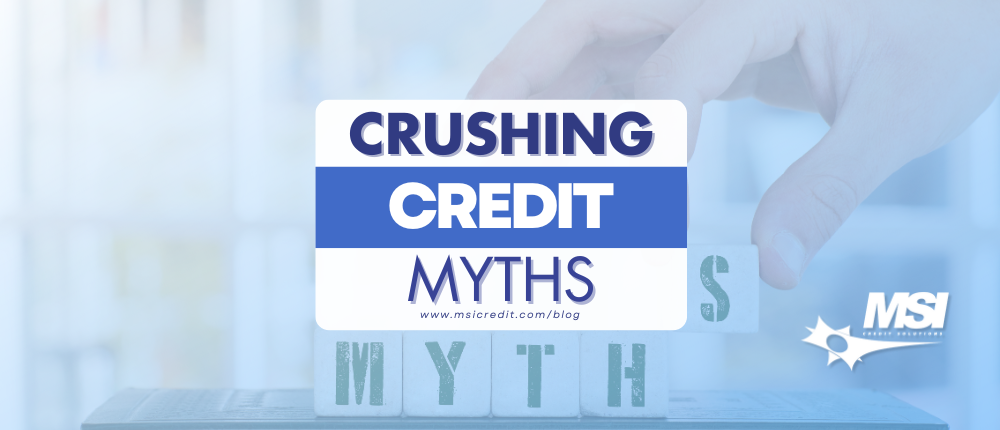Navigating the world of credit can be challenging, especially when surrounded by myths and misinformation. At MSI Credit Solutions, we understand the importance of debunking these myths to empower you on your journey to rebuilding credit. Let’s dispel common misconceptions and provide you with accurate information to propel your credit recovery.
1. Myth: Bad Credit Lasts Forever
Many people believe that once their credit takes a hit, it’s a permanent stain on their financial record. However, this isn’t the case. Credit scores are dynamic and can improve over time with the right strategies.
- Understanding the Timeline: Negative entries such as late payments or collections typically stay on your credit report for up to seven years. However, their impact on your score diminishes over time, especially if you adopt positive credit behaviors.
- Strategic Actions: Actions like making timely payments, reducing outstanding debt, and monitoring your credit regularly can expedite the improvement process. Consistency and discipline in managing your credit obligations can significantly enhance your credit profile.
2. Myth: Closing Old Accounts Improves Credit
A common belief is that closing old credit accounts will boost your credit score by removing old debt or reducing available credit. In reality, this approach can be counterproductive.
- Impact on Credit History: The length of your credit history accounts for a significant portion of your credit score. Closing old accounts can shorten your credit history, which might negatively affect your score.
- Credit Utilization: Additionally, closing accounts reduces your total available credit, which can increase your credit utilization ratio (the amount of credit you’re using relative to your total credit limit). A higher credit utilization ratio can negatively impact your score.
3. Myth: Avoiding Credit Is the Solution
Some people think that avoiding credit altogether will help them avoid credit problems. This approach can actually hinder your ability to rebuild your credit.
- Establishing Positive Credit: Responsible use of credit is essential for building a solid credit history. This includes using credit cards wisely, paying off balances in full, and avoiding late payments.
- Credit Building: Consider using secured credit cards or becoming an authorized user on someone else’s account to build positive credit history while minimizing risks.
4. Myth: Credit Repair Is a Quick Fix
Quick-fix solutions for credit repair are often misleading and unrealistic. Rebuilding credit is a process that requires time and effort.
- Patience and Persistence: Real and lasting credit improvement involves developing good financial habits and being patient. Avoid services that promise rapid results or “quick fixes,” as they may not provide sustainable solutions.
- Long-Term Strategy: Focus on creating a long-term strategy that includes managing debt, paying bills on time, and regularly reviewing your credit reports for errors.
5. Myth: Bankruptcy Spells Financial Doom
While bankruptcy can have significant short-term impacts on your credit, it doesn’t mark the end of your financial future.
- Recovery After Bankruptcy: Post-bankruptcy, you can start rebuilding your credit by following responsible financial practices. This includes budgeting, saving, and gradually re-establishing credit through secured credit cards or small loans.
- Strategic Planning: Strategic planning and disciplined financial behavior can help you rebuild your credit and achieve financial stability over time.
6. Myth: Checking Your Credit Harms Your Score
There’s a misconception that checking your own credit report or score can negatively impact your credit. In reality, this is not the case.
- Monitoring Without Consequences: Checking your own credit report is considered a “soft inquiry,” which does not affect your credit score. Regularly reviewing your credit helps you stay informed about your financial standing and spot any errors or potential issues early.
- Responsible Habit: Use this opportunity to monitor your credit for discrepancies, track your progress, and ensure that all information is accurate.
7. Myth: All Debts Are Equal
Not all debts impact your credit score in the same way. Understanding how different types of debt affect your credit is crucial for effective credit management.
- Strategic Debt Management: Prioritize debts based on their impact on your credit score. For example, high-interest credit card debt might have a more immediate effect on your credit score than a student loan or mortgage. By strategically managing and paying off high-impact debts first, you can improve your credit score more efficiently.
Empower Your Credit Journey with Knowledge
In the world of credit, knowledge is power. By debunking these common credit myths, MSI Credit Solutions aims to empower you with accurate information. Remember, rebuilding credit is a process that requires time, patience, and consistent effort. With the right strategies and a clear understanding of how credit works, you can build a stronger financial future.

Give us a call today for a free credit analysis and consultation!
(866) 217-9841

MSI Credit Solutions provides superior credit restoration and comprehensive consulting services that are reliable and affordable.
*The information in this article has been provided strictly for educational purposes.





